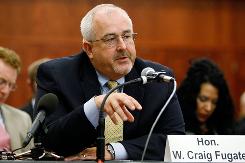|
|
|||||||||||||||||||
By Steve Sternberg, USA TODAY
The nation is woefully unprepared to care for children in a disaster, says an analysis delivered Wednesday to the White House and Congress.
The National Commission on Children and Disasters found that even under normal circumstances, most ambulances and emergency rooms are not prepared to care for severely injured children. "If you think of a disaster, there may be hundreds of thousands of kids who need medical care, and you'll be putting them in an environment where they don't have the experience or equipment to care for kids," says commission member Michael Anderson of Rainbow Babies & Children's Hospital in Cleveland. The bipartisan commission was established three years ago by President Bush to identify gaps in disaster preparedness, response and recovery. Craig Fugate, President Obama's chief of the Federal Emergency Management Administration, says he began meeting with commission members in his first week on the job because he realized from his days as a paramedic that "children are not small adults. You can't scale stuff down and meet the needs of infants and children." The report: •Calls on the White House to develop a national strategy on children and disasters. •Calls for bolstering the pediatric capabilities of the National Disaster Medical System, medical teams that respond to disasters. •Calls for funding to improve disaster planning for schools, child care, juvenile justice and child welfare agencies. •Urges federal agencies to buy "child-appropriate" supplies for ambulances and hospitals. •Recommends creating a national evacuee tracking system to reunite children with families. One positive step was Health and Human Services Secretary Kathleen Sebelius' commitment to bolster the strategic national stockpile of medicines used in emergencies with supplies for children, Anderson says. Still, he worries that now that the commission's work is done, the debate will fade away. "I'm not going to let that happen," he says. "Whether I'm a commissioner or Mike the Pediatrician."
Guidelines: You share in the USA TODAY community, so please keep your comments smart and civil. Don't attack other readers personally, and keep your language decent. Use the "Report Abuse" button to make a difference. Read more.
|
|||||||||||||||||||
|
| |||||||||||||||||||


